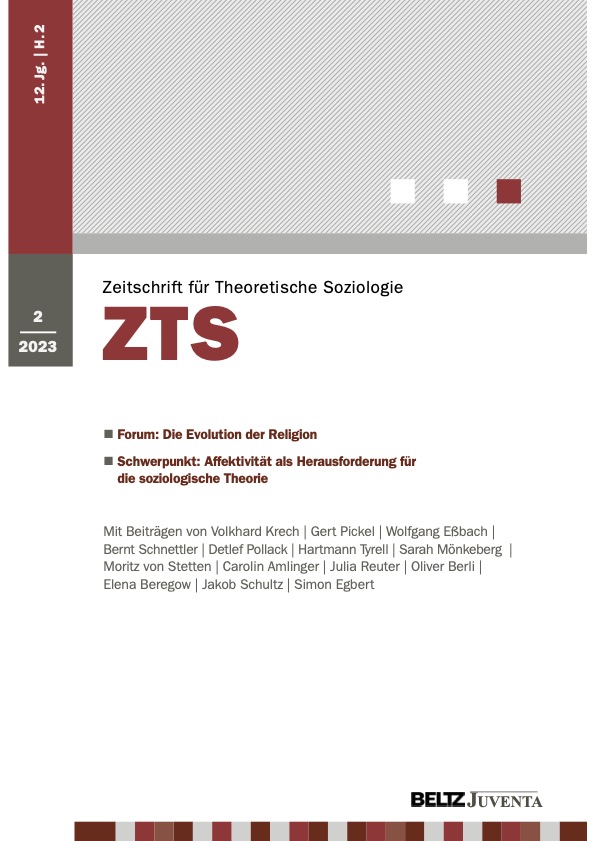Trost spenden. Über das Versprechen der Zukunft in der ›kritischen‹ Sozialtheorie
DOI:
https://doi.org/10.17879/zts-2023-6302Schlagworte:
Kritische Theorie, Revolution, Theoriegeschichte, Tod, Trost, ZukunftsvorstellungenAbstract
In diesem Beitrag wird die These vertreten, dass das Versprechen der Zukunft in der ›kritischen‹ Sozialtheorie einem spezifischen Verständnis von Trostspenden entspricht, wie es sich auch in den Konsolationsschriften der Antike findet. Anstatt das Leiden einfach hinzunehmen, über es hinwegzutrösten, wie es für das moderne Trostverständnis charakteristisch ist, halten die Texte der antiken Consolatio die zu Tröstenden dazu an, ihr Leiden aktiv selbst zugunsten einer wesentlich besseren Zukunft zu überwinden. Diese Struktur der Anrufung taucht auch in Texten der ›kritischen‹ Sozialtheorie auf, was anhand von Marx’ und Engels’ »Manifest der kommunistischen Partei« (1848), Benjamins »Geschichtsphilosophischen Thesen« (1940) und Latours Kampf um Gaia (2015) exemplarisch demonstriert werden soll. Der aktivierende Trost der ›kritischen‹ Sozialtheorie zielt auf die Errichtung einer ›heilen Gesellschaft‹; doch um die ›gesellschaftlichen Pathologien‹ hinter sich zu lassen, ist ein offener Kampf, eine Revolution erforderlich. Zum Schluss wird gezeigt, dass die diametral entgegengesetzten Weltverhältnisse des aktivierenden und passivierenden Trostspendens auf fundamentale Unterschiede in der Auseinandersetzung mit dem menschlichen Tod zurückzuführen sind.
This paper argues that the promise of the future in ›critical‹ social theory corresponds to a specific understanding of consolation as constituted in the consolation writings of antiquity. Rather than simply accepting suffering, consoling over it, as is characteristic of the modern understanding of consolation, the texts of the ancient Consolatio urge those to be consoled to actively overcome their suffering themselves in favor of a much better future. This structure of interpellation also appears in texts of ›critical‹ social theory, which will be exemplified by Marx’ and Engels’ »The Communist Manifesto« (1848), Benjamin’s »Theses on the Philosophy of History« (1940), and Latour’s Facing Gaia (2015). The activating consolation of ›critical‹ social theory aims at the establishment of an ›wholesome society‹; but to leave behind the ›social pathologies‹ an open struggle, a revolution, is required. In conclusion, the paper shows that the diametrically opposed world relations of activating and passivating consolation can be traced back to fundamental differences in dealing with human death.
Downloads
Veröffentlicht
Zitationsvorschlag
Ausgabe
Rubrik
Lizenz
Copyright (c) 2025 Zeitschrift für Theoretische Soziologie

Dieses Werk steht unter der Lizenz Creative Commons Namensnennung - Weitergabe unter gleichen Bedingungen 4.0 International.




